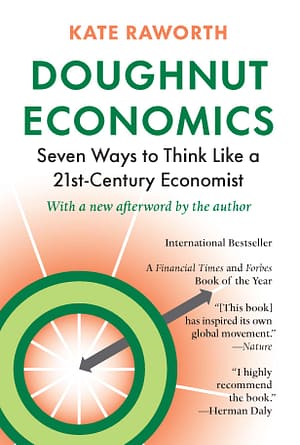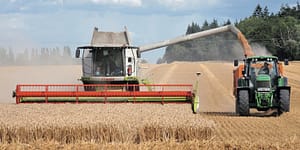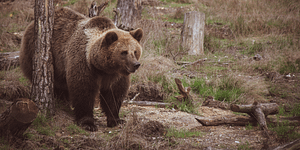Fixing the Economy: Radical Thinking for 21st-Century Economists

The economy is a complex, evolving system, and that’s an empowering thought: it means that every one of us can play a part in shaping its evolution. When it comes to understanding economics you may be familiar with classic texts like Adam Smith’s, but don’t view that as the be-all-end-all, lest you get stuck in the past with most other economists. It’s time to pursue a new forward-thinking perspective, as laid out by economist Kate Raworth in her book Doughnut Economics.
The following is a conversation with Kate about the book.
Q: First things first: Why did you want to write this book?
A: I studied economics at university 25 years ago because I wanted to make a difference in the world and believed that economics – the mother tongue of public policy – would best equip me to do that. Instead, its theories left me disillusioned and frustrated because they brushed over or sidelined all the issues that I thought mattered, from social justice to ecological integrity. A whole quarter-century on, the theories taught have barely changed, and if anything, they have narrowed. Today’s students are going to be the policymakers of 2050 but they are still being handed down ideas from the textbooks of 1950, based on the theories of 1850. Given the challenges ahead, that’s a disaster, and it is jeopardizing all of our futures. So I decided it was time to take 20th-century economics by the horns, flip it on its back, and replace it with an economics that is fit for our times – and that’s exactly what my book aims to do.
Q: Doughnut Economics turns the way we consider economics on its head. How does the Doughnut Economics model depart from the models proposed by economists Adam Smith and Paul Samuelson, and why is it a vital time for a paradigm shift?
A: Smith and Samuelson were both brilliant thinkers, but their ideas got narrowed down and twisted into theories that I think would appall them if they could see the results. What’s more, if alive today, I think they’d be the first to tell us to start looking forward not back, and to come up with ideas fit for our own times.
Smith became famous for his insight into the role of self-interest for making markets work, but he was equally aware of the importance of our interest in others for making society work. He would hate the way his theory has been pared down to create the narrow character of ‘rational economic man’ at the heart of 20th-century economics. I’ve no doubt he’d thoroughly agree with my call for a new portrait of humanity, based on today’s insights from cognitive science, sociology and political science, one which recognizes that we are social, interdependent, fallible, adaptable, and embedded within the living world.
Paul Samuelson’s greatest influence on our thinking was to shape what we think ‘the economy’ is, and he did it in the 1940s with a picture, known as the Circular Flow diagram. Since he was teaching engineering students at the time, he made the economy look like a radiator system, with goods and money flowing round and round like water through pipes. The diagram had its uses but it certainly had its blindspots too. His diagram made no mention of the living world on which all human activity depends. No mention of the household where ‘labour’ is made ready for work every day thanks to the cooking, cleaning, sweeping, and washing done as unpaid work (still mostly done by women). And no mention of the commons, those spaces where people get together (in local neighbourhoods or on the global internet) and self-organise to create things they value with no money changing hands (think of community gardens, or Wikipedia – both greatly valued, both outside of the market: that’s the commons!). These blindspots have come back to bite us, in the form of climate change, the stress of work-life balance, and over-reach of the market into public life.
Economics bases on a narrow character of man and an economy disconnected from society and the planet may have seemed to work well enough in the 20th century. But there will soon be 10 billion of us living together on this one fragile planet, and if we are to thrive together, we need new economic theories that will give us half a chance of doing so. Smith and Samuelson would be the first to agree!
Q: You describe how, over the centuries, the focus of economics has moved from the household to the city-state then to the nation-state. Why do you say it’s time for economics to focus on the planetary household and how does that shape your idea of twenty-first-century economics.
A: Economics, from the Ancient Greek, literally means ‘household management’ and it couldn’t be more relevant today: we urgently need a new generation of economists who are ready to manage our planetary home in the interests of all of its inhabitants. For the last 250 years, partly thanks to Adam Smith’s book The Wealth of Nations, we’ve been stuck considering ourselves as national economies, as if only ever in a race against each other. It’s time to recognize that our collective wellbeing depends upon safeguarding the health of this incredible living planet, and so to have the best chance of thriving this century, we need to think far more innovatively about managing the planetary household that we share.
Q: One of the seven principles of Doughnut Economics is the radical idea that we should stop focusing on GDP growth as a measure of progress. Instead, you argue that the twenty-first-century economists ought to focus on creating an economy that’s distributive and regenerative by design. But doesn’t GDP growth signify a healthy economic environment and well-being for global citizens?
A: Gross Domestic Product is simply the total monetary value of all the goods and services sold in a nation’s economy in a year. It was first calculated in the 1930s by the American economist Simon Kuznets, who, ironically, was among the first to warn that it was in no way a measure of a nation’s welfare. But his warning was ignored and GDP growth soon became a goal in itself. In the Depression era, followed by post-WWII recovery, it may have correlated fairly well with improvements in people’s wellbeing, but it is widely recognized to be a poor measure today.
If we are to step up to the 21st-century challenge of meeting the needs of all within the means of the planet, we need an economy that distributive and regenerative by design. Distributive in that it shares value created far more widely, and regenerative in that it uses materials again and again so that it is working with – not against – Earth’s cyclical processes of life. Getting there is part of a long-term transformation and it’s hard to know how GDP will need to respond in the process: it could go down then up, or up then down, or it could hover steady. In effect, GDP must come to be seen as an adaptive variable, ever-adjusting in response to redesigning the economy. It’s a radically different mindset from the one that has held sway for the past 80 years, of course, and that’s why it deserves far more attention from innovative economic thinkers.

A: Over the past 30 years, the understanding of what ‘human wellbeing’ is has evolved a good deal. It’s increasingly recognised that it depends upon two things: ensuring that everyone has the resources to meet their needs and rights, so they can lead lives of dignity and opportunity; and on safeguarding the planet’s life-support systems that sustain us all. Five years ago I turned that new understanding into a picture, and it came out looking like a doughnut. In the hole in the centre, people are falling short on life’s essentials like food, decent housing, healthcare and political voice, so we want to get everyone out of that space. At the same time, beyond the doughnut’s outer crust is a place of overshoot on Earth’s critical systems, from climate change to biodiversity loss. To meet the needs of all within the means of the planet, we have to get into the Doughnut itself, which is humanity’s safe and just space. And once we take that as the goal, a fascinating question emerges: what economic mindset will give us the best chance of getting there? That’s essentially what my book is about, and writing it has given me the economic adventure of a lifetime.
Q: Doughnut Economics is an optimistic vision of the future—despite worsening climate change, increasing xenophobia, global financial instability, conflict, and widening inequalities around the world. Why are you optimist about the world’s economic future, and the future of our planet?
A: I’m optimistic because we haven’t yet given ourselves a decent chance of figuring these challenges out and last century’s economics is a critical part of what’s holding us back. We need a new story of our economic future, something that we can aspire to create. When I present the Doughnut to diverse audiences – from university students to Fortune 500 companies – I find that people get really fired up: they’re inspired by the positive vision and they want to be part of making it happen.
Q: The book offers a convincing radical new lens to view economics, but does not provide specific policy standards or prescriptions. How do we put Doughnut Economics into practice? What is the first step toward the planetary and social economic balance?
A: The book very intentionally does not set out specific policy recommendations. That’s because I want it to be as relevant in Beijing and Bangalore as in Boston and Birmingham, and as relevant in 10 years time as it is today.
So the first step is simply to realize that the ideas in Doughnut Economics are already being put into practice: there are businesses, communities, policymakers, urban planners, and financiers worldwide who are redesigning what they do so that their work helps to bring humanity into the Doughnut’s safe and just space. It’s the beginnings of a new economy and we can all help to make it grow. Each of us can ask ourselves: how does the way that I shop, eat, and travel, or bank, volunteer, and vote affect humanity’s ability to meet the needs of all within the means of the planet? How could my business be part of making that happen – or how could my community?
See more Doughnut Economics videos here: www.kateraworth.com/animations and order your copy of Doughnut Economics today.
Recent Articles
Why is modern wheat making us sick? That’s the question posed by author Eli Rogosa in Restoring Heritage Grains. Wheat is the most widely grown crop on our planet, yet industrial breeders have transformed this ancient staff of life into a commodity of yield and profit—witness the increase in gluten intolerance and ‘wheat belly’. Modern…
Read MoreUsing herbal medicine to heal the body is an ancient practice. It has since become a worldwide industry. Today, modern-day doctor’s visits and industrial medicine have displaced common knowledge of herbal medicine. Some still remember the ancient practice. In her book Following the Herbal Harvest, Ann Armbrecht interviews one such person, Phyllis Light, a fourth-generation…
Read MoreAddressing the pressing issues affecting everyday Americans is essential—and one of our nation’s most profound challenges is the devastating impact of mass layoffs. Layoffs upend people’s lives, cause enormous stress, and lead to debilitating personal debt. The societal harm caused by mass layoffs has been known for decades. Yet, we do little to stop them.…
Read MoreWhat does facing the beast mean? In this time of uncertainty, we must practice regular reflection to achieve optimal happiness and health. The metaphor below gives insight into confronting and facing it, regardless of what “the beast” is to you. The following is. an excerpt from Facing the Beast by Naomi Wolf. It has been adapted for the…
Read MoreIn a personal investigation into ethical and traceable leather, fashion designer Alice Robinson begins a ground-breaking journey into the origin story of leather and its connection to food and farming. Keep reading to learn more about her process of cutting & shaping leather to create handbags, shoes, clothing, and more! The following is an excerpt from…
Read More








